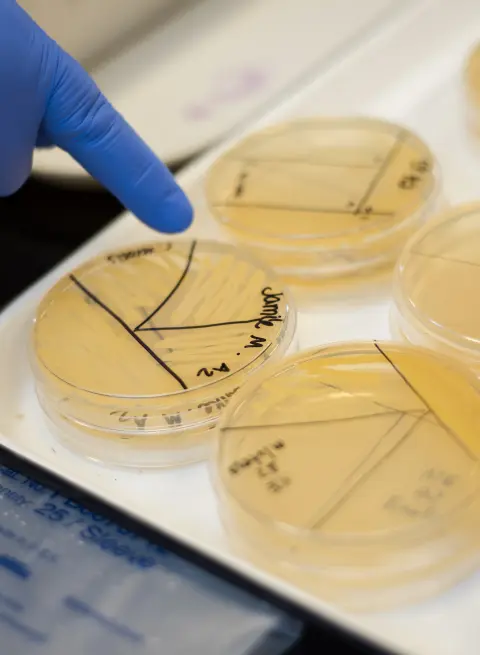
Biology Program Overview
In this program, you’ll explore everything from basic biology and genetics to advanced topics ranging from molecular biology, physiology and marine biology to ecology, botany and toxicology. You’ll conduct faculty-led research in well-equipped laboratories and five nature preserves. You’ll also have opportunities to present the results of important research at local and national conferences. Whether you’re considering employment immediately after graduation or are planning to pursue an advanced degree, you’ll have the knowledge and hands-on training you need to take your next steps with confidence.
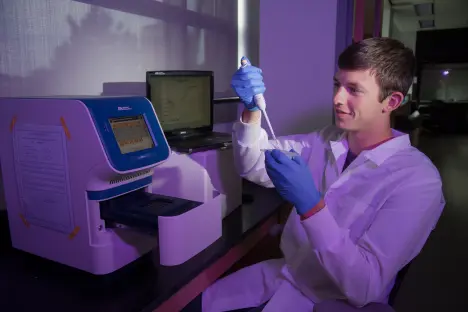
Optional Concentrations
Forensic Biology
The forensic biology program was developed to meet the needs of students interested in pursuing a career in forensic biology, the application of biological principles to law enforcement. The major provides a strong basic background in both biology and chemistry, along with specialized upper level courses specifically applicable to forensics. Course work in criminal justice and other areas provide additional perspectives. After graduation, forensic biology majors will be well prepared for either on-the-job training in a forensics laboratory or for graduate study in the area of forensics.
Medical Laboratory Science
This concentration provides students with a biology degree, and with the completion of the extended senior year at one of our partner programs at the Akron Children's Hospital or the Cleveland Clinic, eligibility for certification as a Medical Laboratory Scientist. Certified Medical Laboratory Scientists work in hospitals and other clinical laboratories, processing patient samples and performing tests essential for doctors to properly diagnose and treat patients. With increasing numbers of aging persons requiring more medical care in the United States, medical technology is an expanding field with an excellent employment rate for graduates, especially those with the appropriate certifications.
Is a Career in Biology Right for You?
This program is ideal for anyone who:
- Wants to pursue a career in human or veterinary medicine.
- Likes the idea of becoming a lab technician or doing meaningful research.
- Is fascinated by living systems of all kinds from those in plants to fungi and marine life.
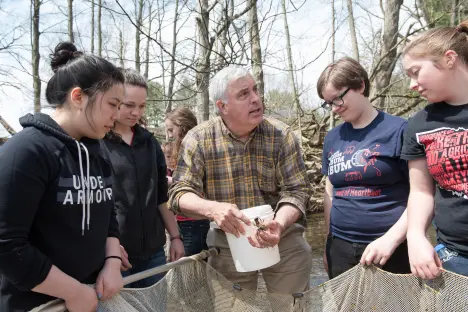
Learning Experiences
You can look forward to:
- Learning from a group of extraordinary professors who are respected scholars in their fields.
- Having the flexibility to focus your program in a very specific direction by adding a forensic biology or biotechnology concentration to your biology major.
- Having opportunities to conduct research in unique facilities, such as:
- Four laboratories dedicated to collaborative research.
- A greenhouse and facility for housing research animals.
- Five local environmental preserves and modern science instrumentation.
Tri-Beta Biology Honor Society
This honor society is a great way to connect with other students in service and social activities and to help improve the understanding of biology.
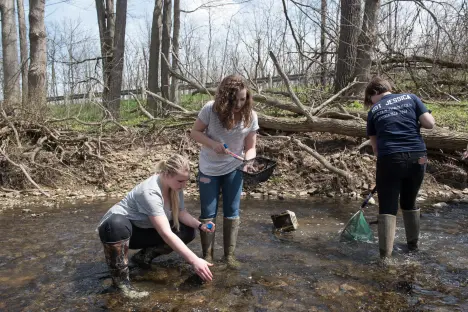
Student Internships
You’ll have opportunities to participate in summer research internships at prestigious research universities, governmental organizations and on the AU campus. For example, Ashland University is a member of the Bioscience Consortium of Northeast Ohio, which supports biotechnology education and undergraduate research, as well as student internships. The Ohio Agricultural Research and Development Center in Wooster and Charles River Laboratories also routinely provide internships for biology majors.

Sample Curriculum
Learn more about the biology curriculum by reviewing the Four-Year Curriculum Guide, Academic Catalog and Course Rotation.
Optional biology concentrations include forensic biology and medical laboratory science.
Also interested in Environmental Science? Check out our environmental science/biology double major designed for students who wish to pursue a career in environmental science or biology with an emphasis in environmental science.
First Year
Second Year
Third Year
Fourth Year
Scholarships

Ashland University has been awarded a grant from the state of Ohio to provide Choose Ohio First Scholarships to outstanding students with interests in the natural and physical sciences. These scholarships support academically strong students who plan to continue to graduate school, health-related professional programs or employment in STEM industries after completing a bachelor’s degree.
AU Dean's Scholarship
The Dean's Scholarship was created to enhance the undergraduate academic experience for new first-time and transfer students enrolled in a major within the College of Arts & Sciences. It is a merit-based, renewable scholarship that can be "stacked" on top of other awarded AU academic scholarships. In addition, students have the opportunity to participate in unique academic communities with a focus on career coaching and preparation.
Ohio EPA Scholarship
These merit based, nonrenewable scholarships will be given to undergraduate students enrolled at an Ohio public or private college/university who can demonstrate their knowledge and commitment to careers in environmental sciences or environmental engineering. Students must be entering their Junior or Senior year. Awardees will be selected by the Academy appointed panel.
Graduate Outcomes
Biology majors have a strong track record of entering health professional schools, including medical, physician assistant and veterinary schools. Since 2004, more than 90 percent of AU biology majors who have applied to health professional schools have been admitted within one year of graduation. Our majors also find lucrative employment directly after graduation.
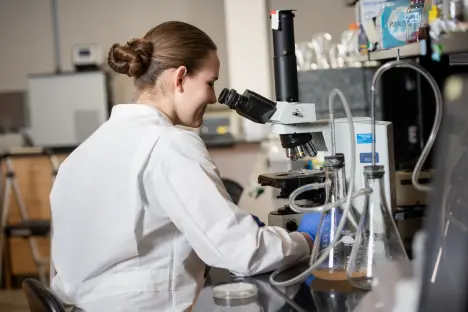
Employers of Recent Graduates
Recent graduates of the biology program found employment at:
- Charles River Laboratories
- Toledo Zoo
- Battelle Corporation
- University of Kansas Medical Center
- Central Admixture Pharmacy Services
- Cleveland Cord Blood Center
- United Way of Knox County
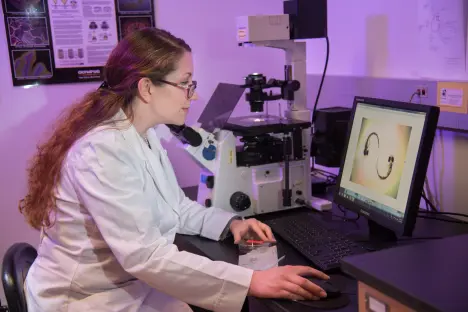
Career Opportunities
There is a broad range of career pathways open to biology majors. The U.S. Bureau of Labor Statistics (BLS) projects that careers in biology will grow over the next decade. In particular, the BLS forecasts that biological technician jobs will grow at a rate of 7 percent from 2023 to 2033. In 2023, the median salary of a biological technician was $51,430. Environmental scientists earned a median salary of $78,980 in 2023, and jobs for environmental scientists are expected to grow by 7 percent.